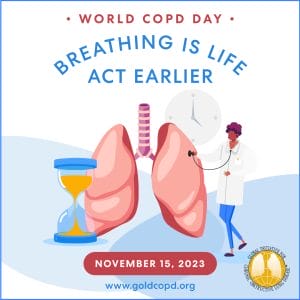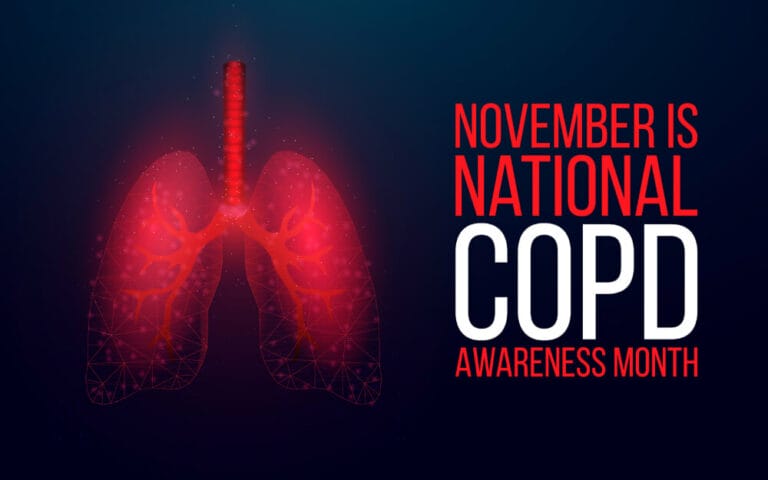14th November 2023
In this blog, we are looking at the 2023 World COPD Day theme ‘Act earlier’. We’re considering the importance of early lung health, early diagnosis, and early interventions. This matters because early detection will drive timely interventions.
Prevention is better than a cure
Prevention is always better than a cure. Therefore, how we minimise the risks for developing COPD, is the crux of the matter. The Global Initiative for Chronic Obstructive Lung Disease (GOLD) advocates that as health care professionals, we must make the most of opportunities to act sooner. This includes recognising COPD can start early in life, affecting young individuals, and expanding our knowledge of pre-curser conditions, such as Pre-COPD and Preserved Ratio Impaired Spirometry (PRISm).
What do we mean by early lung health?
“Childhood disadvantage factors” is a concept presented in the GOLD (2023) report. As far back as 2005, Lowler et al hypothesised there was positive linear associations between birth weight and lung function. This opens the debate for the wider determinants of health. The Kings fund (2013) argue health is regulated by many factors; the synergy between the person, their lifestyle, physical, social, and economic environment. We therefore cannot waste any time; investigating early lung health, cognisant these are key determinants of lung function in adult life is our driver (Bose et al 2022).
Pre-curser conditions: Pre-COPD

Pre-COPD refers to individuals with respiratory symptoms, with or without structural abnormalities, but without airflow obstruction (Martinez et al 2022). The pathogenesis of COPD and importance of identifying individuals at risk of developing COPD needs our attention. Some individuals, even despite structural pathological abnormalities, including low FEV1 present without airflow obstruction. Individuals with PRISm are at risk of developing airflow limitation but not all do (Martinez et al 2022).
To meet the GOLD (2023) incentive for early intervention, the need to determine the appropriate pathways for optimising treatment beyond smoking cessation is required.
Early Diagnosis
Progressive lung function decline, especially in patients who continue to have exposure to risk factors, requires early intervention and early diagnosis, cognisant of those individuals “at risk” or at the undiagnosed pre-clinical stage, to prevent the person progressing to overt COPD (Choi and Rhee 2020). This requires being alert to the modifiable risk factors such as smoking and exposure to air pollutants, and unmodifiable risk factors such as early life disadvantages including low birth weight, maternal smoking during pregnancy and pre-term delivery (Choi and Rhee 2020). Screening spirometry may improve early detection in patients with normal lung function (Price et al 2010) and identifying patients, such as those with respiratory symptoms but normal spirometry who may require further evaluation using diagnostic spirometry.
Early Interventions
Smoking cessation should be encouraged given its beneficial effects (Li et al. 2022). Additional risk factors such as exposure to indoor and outdoor pollutants and occupational exposure are measures towards COPD avoidance (Price et al 2010). Encouraging uptake of appropriate vaccinations with healthy lifestyle advice, supported by motivational interviewing to encourage positive behavioural choices is something we can do (Gagneur 2020).

Summary
COPD is complex and heterogenous, it requires a person-centred approach. Acting sooner for people at risk of developing COPD is a priority. The phased ban on smoking, and restrictions on the marketing of vapes set out in The Kings Speech (GOV.UK 2023), may be the first tentative steps towards the wider public health agenda for improving the public’s health in Britain; one strategy towards preventing COPD.
We must shift the paradigm away from COPD as a disease in the older adult as a result of lifelong smoking, and push the boundaries by acting sooner, addressing the wider determinants of health to minimise the impact of COPD with prevention, early detection and early intervention.
Want to learn more?
Education for Health is dedicated to giving healthcare professionals the knowledge and know-how to support their patients. We provide this through education, training, and support resources. In addition, by partnering with other like-minded organisations, we are able to offer a holistic approach.
By offering education, training and support we play our part in upskilling the people on the frontline who are dealing with the challenges brought about by the rise in respiratory disease. Our accredited respiratory courses are available at diploma and undergraduate levels, and our postgraduate modules offer specialisms in improving respiratory care. This breadth of choice allows you to select the most appropriate level for your current role or for career progression – visit our Online Shop for more information. Together we can make a difference!
References
- Bose, S., Pascoe, C., and McEvoy, C., (2022). Lifetime lung function trajectories and COPD: when the train derails. Available at: https://www.thelancet.com/journals/lanres/article/PIIS2213-2600(22)00391-5/fulltext. Accessed 09.11.23.
- Choi, JY., and Rhee, CK., (2020). Diagnosis and Treatment of early Chronic Obstructive Lung Disease (COPD) Journal of Clinical Medicine Nov 9 (11) 3426
- Gagneur, A., (2020). Motivational interviewing: A powerful tool to address vaccine hesitancy. Can Commun Dis Rep. 46(4):93–7. Available at: https://pubmed.ncbi.nlm.nih.gov/32281992/. Accessed 09.11.23.
- GOLD (2023.) Global Strategy for the Diagnosis, Management and Prevention of Chronic Obstructive Pulmonary Disease. 2023 Report. Available at:
- https://goldcopd.org/2023-gold-report/. Accessed 09.11.23.
- GOV.UK (2023) Oral statement to Parliament: The King’s Speech 2023. Available at: https://www.gov.uk/government/speeches/the-kings-speech-2023. Accessed 09.11.23.
- Kings Fund (2013). Time to think differently. Broader determinants of health: Future trends. Available at: https://www.kingsfund.org.uk/projects/time-think-differently/trends-broader-determinants-health. Accessed 09.11.23.
- Lawlor, D., Ebrahim, A S., Davey Smith, G. (2005). Association of birth weight with adult lung function: findings from the British Women’s Heart and Health Study and a meta-analysis Available at: https://thorax.bmj.com/content/thoraxjnl/60/10/851.full.pdf. Accessed 09.11.23.
- Li, X., Wu, Z., Xue, M. et al. (2022). An observational study of the effects of smoking cessation earlier on the clinical characteristics and course of acute exacerbations of chronic obstructive pulmonary disease. BMC Pulmonary Medicine. Available at: https://doi.org/10.1186/s12890-022-02187-5. Accessed 09.11.23.
- Martinez, FJ., Celli, BR., et al (2022.) Treatment in young patients with Chronic Obstructive Pulmonary Disease and Pre- Chronic Obstructive Pulmonary Disease: time to move forward. American Journal Respiratory Critical Care Medicine; 205 (3) pp: 275-287.
- Price, D., Freeman, D., Cleland, J., Kaplan, A., Cerasoli, F., (2010). Earlier diagnosis and earlier treatment of COPD in primary care. Primary Care Respiratory Journal. Available at: https://www.ncbi.nlm.nih.gov/pmc/articles/PMC6602161/pdf/pcrj201060.pdf. Accessed 09.11.23.

